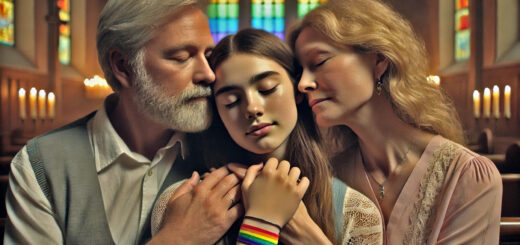Five things that a Catholic parent should know when a child comes out
Reflections by Karen Kaffenberger* published on Outreach.Faith (United States) on May 14, 2024. Freely translated by Angelica Mancuso.
As a Catholic parent of three adult children LGBTQ, I would like to be able to tell you that their "coming out" and the consequent path were faced by me and my husband with perfect clarity, wisdom, faith and love. But that's not the case.
It was difficult for us. Sometimes we had more questions than answers. In recent years, we have known many other Catholic parents like us, eager to share their path and what they had learned from being parents of homosexual children. Therefore, on the basis of both our family experience and the stories of other Catholic parents, I would like to share five tips with you.
In the article, real names are not used and some details have been deliberately left vague to protect families who have not yet exposed themselves or want to remain anonymous. I also received approval to share our journey from our children.
1 Being parent of homosexual children can be a challenge
It all started on January 26, 2014. To say that the first two months of the year were difficult and demanding would be an understatement. It was more like being taken by a tornado and dragged in the middle of nothing: upset, injured and looking for the way home without the GPS.
To each of our children we said that we would love them throughout the journey to their destiny and that we would have been by their side to support them.
To our second son, Jett, male at birth, was diagnosed with autistic spectrum disorder and gender dysphoria at the age of 14. Even before we could discuss the diagnosis with a psychologist, Jett attempted suicide.
Thanks to the help of a psychiatric hospital expert in the treatment of children and a behavioral health organization, Jett has recovered. After the care, we understood what was wrong.
Sadly, she believed that we were completely against her and that nothing could change. She was transgender and felt she could no longer live as before. He wanted to be called with his new name, Neriah. It was fine for us. He said he no longer believes in God and not wanting to go to Mass anymore. We didn't agree, but we respected his desires.
We still didn't understand what all this meant. We knew something about gender dysphoria, but we didn't know anything about what he meant to be transgender. Our daughter had never talked about anything.
Hormonal therapy and the transition were also unknown to us. But the care for the depression and anxiety of Neriah have made miracles. After several months, she finally understood that we loved it and supported her.
A couple of years later this, our eldest son told us to be gay. About a year later, our younger daughter came from me one day, looked at me in the eye and told me to be gay and to have a girlfriend of the Catholic school who both attended. Our daughter Trans then decided to return to the church. To each of them we reiterated that we would love them throughout their journey to their destiny and that we would support them.
2 Your Son/A could never make coming out or do it only with a parent
In our family, our younger daughter has come out with me, but not with my husband. He asked me if I could tell his father, because she felt at ease like this.
A Catholic parent, Laura, told me about her experience. Two of his four children are homosexuals. The older one made up with both parents, but their daughter has never officially made coming out. "He started attending girls at college," explained Laura. “After a while, I asked her questions about it and she got nervous. He didn't think I had to ask her who was attending, so I gave up. "
3 It is normal to suffer at the thought of life that you had imagined for your child.
Nick, another Catholic parent, tells the story of his daughter who came out both with him and his wife. His daughter had attended some boys at school, the second during his last year. But something seemed ... different. "It didn't seem like a normal relationship," said Nick. “They were more two friends I liked to play. Now that he told us, it's like saying 'Ah, now he has much more sense'. '
Nick realized that he had clung to the imagination of life he had imagined for his daughter. He had to let go of what he had in mind of his future and give himself time to adapt to changes.
4 You can be a Catholic and do not agree, but you have to have respect
Cody and Maria, a Catholic couple, took two LGBTQ teenagers in a foster care. “We made a great effort to always use the names and pronouns they had chosen. Sometimes we were wrong, but we always apologized, "Maria said.
5 Keep the relationship with your children. Remain tied
"Even if we do not agree with the choices of our children, the most important value must always be the bond that unites us," said Faye, mother of three adult daughters. "Christ does not call us to correct others, but to love them."
*Karen Kaffenberger is an artist owner of the Three Trails Art studio in Kansas, Mo. Supporter of the LGBTQ community, he uses her talent as an ex-marketing and is founder of the present creative group who fights in favor of social justice.
Original text: Five Things Every Catholic Parent Should Know Their Child Comes Out






